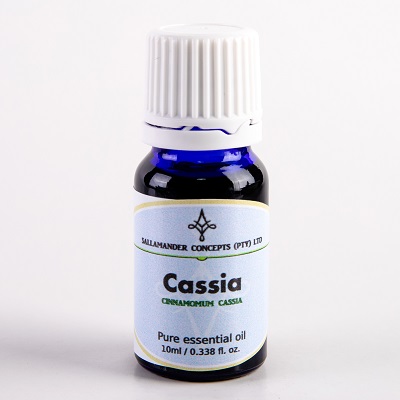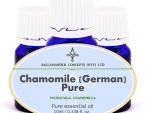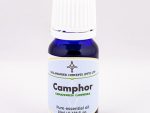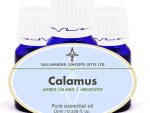Cassia essential oil information
Cassia essential oil is extracted from Cinnamomum cassia (also known as C. aromaticum and Laurus cassia) of the Lauraceae family. It is also known as false cinnamon and cassia lignea.
Properties
Cassia Oil has a warm pungent smell and is usually yellow to yellow/brown in colour.
Origin of Cassia Essential Oil
It is native to China and is also known as cassia bark or Chinese cinnamon. This slender, evergreen tree grows up to 20 meters (65 feet) high, with thick, leathery leaves and small white flowers. The flowers are followed by single-seeded berries the size of small olives. The bark is widely used to flavor curries, in baked foods, candies and soft drinks.
Extraction
This essential oil is extracted from the leaves, bark, twigs and stalks by steam distillation.
Chemical composition
From the leaf:
(E)-Cinnamaldehyde, (E)-Cinnamyl acetate, (Z)-Cinnamaldehyde, B, Benzyl benzoate, Coumarin, enzaldehyde, Salicylaldehyde, α-Copaene, Phenylpropanal, Anisaldehyde, Cinnamyl alcohol, Methyeugenol (traces).
Suggested precautions
Cassia oil is contraindicated for use in pregnancy and breastfeeding – do not use when pregnant or breastfeeding.
This oil should be used in very low dilutions on the skin. Extreme caution is advised when using Cassia essential oil on the skin of the elderly, children under 6 years of age and if the skin is damaged or diseased.
Please read our page with heading: Safety with Essential Oils before using this oil.
We recommend the following book as an excellent resource regarding safety:
Essential Oil Safety: A Guide for Health Care Professionals by Robert Tisserand & Rodney Young (#ad)
Therapeutic properties of Cassia Essential Oil
The therapeutic properties are carminative, anti-diarrhea, anti-microbial and anti-emetic.
Uses
On the skin:
Although this essential oil is a dermal irritant, it may be of benefit for arthritis and rheumatism if included in a formula at a low inclusion rate. We suggest that you rather not use Cassia essential oil in massage therapy.
Burners and Vaporizers
Used in a burner, humidifier or vaporizer, it can be useful for digestive complaints such as flatulence, colic, dyspepsia, diarrhea and nausea. It can also be used for colds, influenza, fevers, arthritis and rheumatism.
In vapor therapy this oil will assist with fevers, colds, flu, low vitality, chills and will also support the digestive system.
Suggested dilution rates:
On the skin:
Adult
Cassia oil is a known skin irritant. We recommend a maximum dilution rate of 0.05%. Use cautiously on healthy adults with healthy and unbroken skin only.
3 to 24 months:
Do not use. Avoid
2 to 6 years
Do not use. Avoid
6 to 15 years
Cassia oil is a known skin irritant. We recommend a maximum dilution rate of 0.05%. Use cautiously on healthy and unbroken skin only.
Pregnancy
Do not use. Avoid Cassia essential oil when pregnant or breastfeeding.
- When in doubt consult your doctor / medical professional before use.
- Most professionals and/or Aromatherapists will always err on the side of safety when giving advice regarding the use of essential oils and oleo resins during pregnancy.
- Quite a number of Aromatherapists advise that you should avoid essential oils completely while pregnant, specifically during the first trimester. This is a very safe approach but may not be necessary at all. This does apply in the case of Cassia essential oil though.
Burners and Vaporizers
use 2 to 8 drops.
General:
- When using for the first time – Always use the lowest dilution rate and build up slowly to the maximum. Stop using all essential oils on the skin if irritation or allergy occurs.
- Any advice or instruction received from a medical professional ALWAYS supersedes recommendations or advice found on this website. When in doubt consult your doctor / medical professional.
Summary
Although this oil can be a skin irritant, it does have some good properties and this warm exotic oil is more than just a fragrant oil, as it can be used in fever, chills and for supporting the digestive system. Cassia essential oil is found to be more beneficial if used in vapor therapy to treat respiratory and digestive complaints. If used on the skin, extremely low dilution rates are suggested. Do not use Cassia essential oil if pregnant or breastfeeding, and avoid use of this oil in children under the age of 6 years. Extreme caution should be taken when using this oil on the skin, specifically when treating the sick and the elderly.
Cassia Essential Oil blends well with
Cassia essential oil blends well with Cedarwood, Clove, Frankincense, Lavender, Lemon, Orange, and Ylang Ylang





